人教版高中英语必修一unit3_reading课文语法填空
英语高考复习人教英语必修一 Unit 3 课文词汇语法填空

人教版英语必修一Unit 3课文语法填空PART 1 THE DREAM AND THE PLANMy name is Wang Kun. Ever since middle school, my sister Wang Wei and I 1____________(dream) about taking a great bike trip. Two years ago she bought an expensive mountain bike and then she persuaded me 2_______ buy one. Last year, she visited our cousins, Dao Wei and Yu Hang at their college in Kunming. They are Dai and grew up in western Yunnan Province near the Lancang River, 3________ Chinese part of the river 4__________ is called the Mekong River in other countries. Wang Wei soon got them 5____________(interest) in cycling too. After graduating 6__________ college, we finally got the chance to take a bike trip. I asked my sister, "Where are we going?" It was my sister 7__________ first had the idea to cycle along the entire Mekong River from 8___________ it begins to where it ends. Now she 9_______________(plan) our schedule for the trip.I am fond of my sister but she has one serious shortcoming. She can be really stubborn. Although she didn't know the best way of getting to places, she insisted that she 10_____________ (organize) the trip properly. Now, I know that the proper way is always her way. I kept asking her, "When are we leaving and when are we coming back?" I asked her whether she 11_____________(look) at a map yet. Of course, she hadn't; my sister doesn't care 12__________ details. So I told her that the source of the Mekong 13__________(be) in Qinghai Province. She gave me a 14____________(determine) look—the kind that said she would not change her mind. When I told her that our journey would begin at 15_________ altitude of more than 5,000 metres, she seemed to be excited about it. When I told her the air would be hard 16______________(breath) and it would be very cold, she said it would be an interesting experience. I know my sister well. Once she has made up her mind, nothing can change it. Finally, I had to give 17________.Several months before our trip, Wang Wei and I went to the library. We found a large atlas with good maps 18_________ showed details of world geography. From the atlas we could see that the Mekong River begins in a glacier on a Tibetan mountain. At first the river is small and the water is clear and cold. Then it begins to move quickly. It becomes 19___________(rapid) as it passes through deep valleys, 20_____________(travel) across western Yunnan Province. Sometimes the river becomes a waterfall and enters wide valleys. We were both surprised to learn that half of the river is in China. After it leaves China and the high altitude, the Mekong becomes wide,brown and warm. As it enters Southeast Asia, its pace slows. It makes wide bends or meanders through low valleys to the plains where rice 21__________(grow). At last, the river delta enters the South China Sea.Although it was autumn, the snow was already beginning to fall in Tibet. Our legs were so heavy and cold 1_________ they felt like blocks of ice. Have you ever seen snowmen ride bicycles? That's 2__________ we looked like! Along the way children 3___________(dress) in long wool coats stopped to look at us. In the late afternoon we found it was so cold that our water bottles 4___________(freeze). However, the lakes shone like glass 5________ the setting sun and looked wonderful. Wang Wei rode in front of me as usual. She is very 6___________(rely) and I knew I did't need to encourage her. To climb the mountains 7________(be) hard work but as we looked around us, we were surprised by the view. We seemed to be able to see for miles. 8________ one point we were so high that we found ourselves 9___________(cycle) through clouds. Then we began going down the hills. It was great fun especially as it gradually became much 10___________(warm). In the valleys colourful butterflies flew around us and we saw many yaks and sheep eating green grass. At this point we had to change our caps, coats, gloves and trousers 11________ T-shirts and shorts.In the early evening we always stop to make camp. We put 12________ our tent and then we eat. After supper Wang Wei put her head 13_________ on her pillow and went to sleep but I stayed 14___________(wake). At midnight the sky became 15___________(clear) and the stars grew brighter. It was so quiet. There was almost no wind—only the 16___________(flame) of our fire for company. As I 17__________(lie) beneath the stars I thought about how far we had already travelled.We will reach Dali in Yunnan Province soon, 18___________ our cousins Dao Wei and Yu Hang will join us. We can hardly wait to see them!。
人教版高中英语必修一课文理解-unit3_reading阅读训练
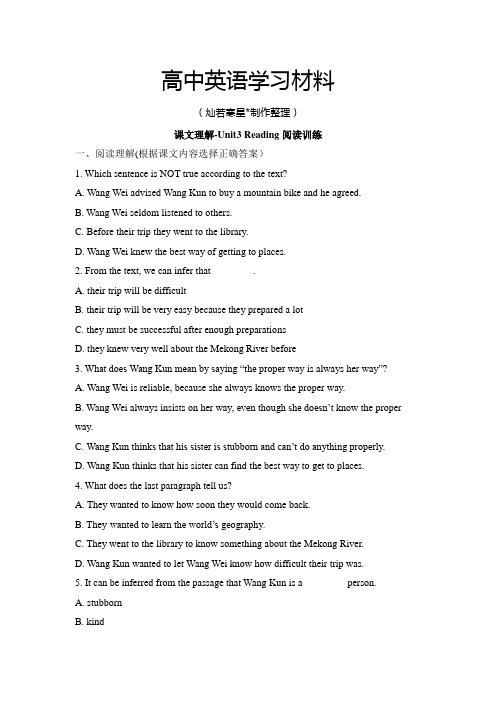
高中英语学习材料(灿若寒星*制作整理)课文理解-Unit3 Reading阅读训练一、阅读理解(根据课文内容选择正确答案)1. Which sentence is NOT true according to the text?A. Wang Wei advised Wang Kun to buy a mountain bike and he agreed.B. Wang Wei seldom listened to others.C. Before their trip they went to the library.D. Wang Wei knew the best way of getting to places.2. From the text, we can infer that ________.A. their trip will be difficultB. their trip will be very easy because they prepared a lotC. they must be successful after enough preparationsD. they knew very well about the Mekong River before3. What does Wang Kun mean by saying “the proper way is always her way”?A. Wang Wei is reliable, because she always knows the proper way.B. Wang Wei always insists on her way, even though she doesn’t know the proper way.C. Wang Kun thinks that his sister is stubborn and can’t do anything properly.D. Wang Kun thinks that his sister can find the best way to get to places.4. What does the last paragraph tell us?A. They wanted to know how soon they would come back.B. They wanted to learn the world’s geography.C. They went to the library to know something about the Mekong River.D. Wang Kun wanted to let Wang Wei know how difficult their trip was.5. It can be inferred from the passage that Wang Kun is a ________ person.A. stubbornB. kindC. braveD. careful参考答案:1-5 DABCD。
人教版高一必修一第三单元复习单句语法填空
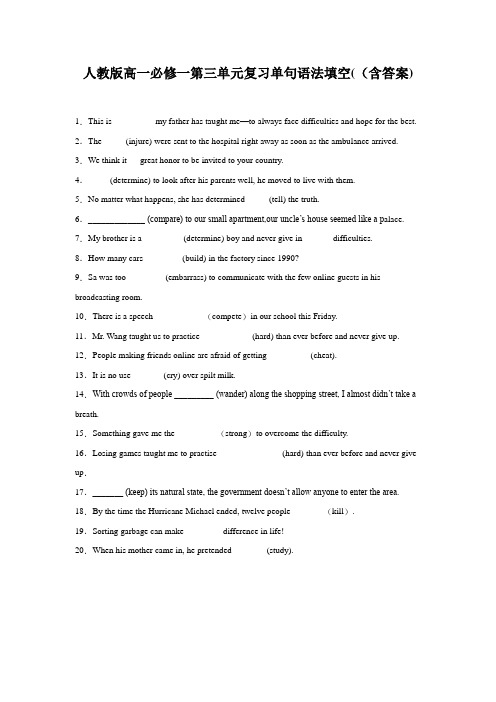
人教版高一必修一第三单元复习单句语法填空((含答案)1.This is _________ my father has taught me—to always face difficulties and hope for the best. 2.The _____(injure) were sent to the hospital right away as soon as the ambulance arrived. 3.We think it __ great honor to be invited to your country.4._____(determine) to look after his parents well, he moved to live with them.5.No matter what happens, she has determined _____(tell) the truth.6._____________ (compare) to our small apartment,our uncle’s house seemed like a p alace. 7.My brother is a _________(determine) boy and never give in ______ difficulties.8.How many cars ________ (build) in the factory since 1990?9.Sa was too ________ (embarrass) to communicate with the few online guests in his broadcasting room.10.There is a speech ___________(compete)in our school this Friday.11.Mr. Wang taught us to practice ___________ (hard) than ever before and never give up. 12.People making friends online are afraid of getting _________ (cheat).13.It is no use _______(cry) over spilt milk.14.With crowds of people _________ (wander) along the shopping street, I almost didn’t take a breath.15.Something gave me the _________(strong)to overcome the difficulty.16.Losing games taught me to practise_______________(hard) than ever before and never give up.17._______ (keep) its natural state, the government doesn’t allow anyone to enter the area. 18.By the time the Hurricane Michael ended, twelve people _______(kill).19.Sorting garbage can make ________ difference in life!20.When his mother came in, he pretended _______ (study).参考答案1.what【详解】考查表语从句。
高中英语必修一全册课文语法填空原创(2019新人教版)
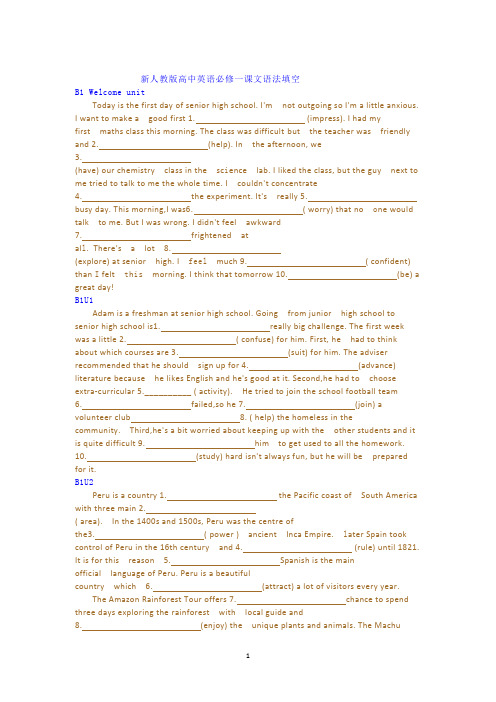
新人教版高中英语必修一课文语法填空B1 Welcome unitToday is the first day of senior high school. I'm not outgoing so I'm a little anxious.I want to make a good first 1. (impress). I had myfirst maths class this morning. The class was difficult but the teacher was friendly and 2.(help). In the afternoon, we3.(have) our chemistry class in the sc i ence lab. I liked the class, but the guy next to me tried to talk to me the whole time. I couldn't concentrate4.the experiment. It's really5.busy day. This morning,I was6.( worry) that no o ne would talk to me. But I was wrong. I didn't feel awkward7.frightened atal l. There's a lot8.(explore) at senior high. I feel much 9.( confident) than I felt t h is morning. I think that tomorrow 10.(be) a great day!B1U1Adam is a freshman at senior high school. Going from junior high school to senior high school is1.really big challenge. The first week was a little 2.( confuse) for him. First, he had to think about which courses are 3.(suit) for him. The adviser recommended that he should sign up for 4.(advance) literature because he likes English and he's good at it. Second,he had to choose extra-curricular 5.__________ ( activity).He tried to join the school football team6.failed,so he7.(join) a volunteer club8. ( help) the homeless in thecommunity.Third,he's a bit worried about keeping up with the other students and it is quite difficult 9.him to get used to all the homework. 10.(study) hard isn't always fun, but he will be prepared for it.B1U2Peru is a country 1. the Pacific coast of South America with three main 2.( area).In the 1400s and 1500s, Peru was the centre ofthe3.( power )ancient Inca Empire.l ater Spain took control of Peru in the 16th century and 4. (rule) until 1821. It is for this reason 5.Spanish is the mainofficial language of Peru. Peru is a beautifulcountry which 6.(attract) a lot of visitors every year.The Amazon Rainforest Tour offers 7.chance to spend three days exploring the rainforest with local guide and8.(enjoy) the unique plants and animals. The MachuPicchu Tour will take you on I amazing paths through the Andes Mountains on the way to the city of Machu Picchu where you will have a day9.(explore) and10.( amaze) by this ancient city.B1U3Today I will introduce two of the “Living Legends of Sports”to you. One is Lang Ping, and 1.other is Michael Jordan. Lang Ping is2.( know) to Chinese people as a player and a coach. As a player, Lang Ping brought honour and glory to her country. As a coach, Lang Ping3. ( lead) her volleyball team to Olympic gold in Brazil in 2016.Michael Jordan is known as“Air Jordan”, who showed great mental4. (strong) in the games. He says that the secret5.his success is learning from failures. He also says that he can ac c e p t6.(fail),but he can't acceptnot7. ( try ). Losing games taughthim7.( practise) harder and never give9.. Besides,he has learnt to share his success with others.Although they are in different sports, they are both10.(master) and set good examples for others.B1U4Strange things were happening in Tangshan. For a few days, the water in the village wells rose and 1. (fall). Deep cracks appeared in the well walls. Chickens, pigs,dogs, andeven mice became nervous. Bright lights were seen in the sky and loud noises were heard. But people paid no attention to them.At 3:42 a. m. ,everything began to shake. It seemed as if the world were coming to 2.end ! One of the most 3. ( dead) earthquakes of the 20th century had begun. 4. less than one minute, the city lay in 5. ( ruin ). Two thirds of the people who lived there were dead or injured. Thousands of children were left without parents. The number of people who were killed or badly injured 6. (be) more than 400 ,000. Then later that i afternoon, another big quake shook Tangshan again. People began to wonder how long the disaster would last.But hope was not 7. ( lose). Rescuers,including soldiers, doctors, nurses and workers came to help. The soldiers dug out the people who 8.( trap ) and buried the dead. Workers built shelters for survivors 9. homes had been destroyed. Slowly, the city began to breathe and revive10. (it). With strongsupport from the government and the tireless efforts of the city' s people,a new Tangshan was built upon the earthquake ruins.B1U5China is 1. (wide) known for its ancient civilisation, and o ne of the factors is the Chinese writing system.The earliest written Chinese was 2.picture- based language. There were animal bonesand shells on which symbols 3.(carve). Later the symbols became a well-developed writing system. Over time,it developed into different forms. because the Chinese people were divided geographically at that time, leadingto many 4.(variety) of dialects and characters.It was after Emperor Qinshihuang united the seven major st ate s5.the Chinese writing system began to develop in one direction.Written Chinese has become an important means6.which China's present is connected with its past.People i n modern times can read the c l assi c works 7.were written by Chinese in ancient times. Today, the Chinese writing system i s still an i mportant part of Chinese culture. As China plays a great role in 8.(globe) affairs, an9. ( increase )number of international students are beginning10.( appreciate) China's culture and history.参考答案:B1Welcome unit1. impression2. helpful3.had4. on5. a6. worried7. or8. to explore9. more confident10. will beB1U11.a2. confusing3. suitable4. advanced5. activities6. but7. joined8. to help9. for 10. StudyingB1U21. on2. areas3. powerful4. ruled5. that6. attracts7. a8. enjoying9. to explore 10. be amazedB1U31. the2. known3. led4. strength5.to6. failure7. trying8. to practise9. up 10. mastersB1U41.fell2. an3. deadly4. In5. ruins6. was7. lost8. were trapped9. whose 10.itselfB1U51. widely2. a3. were carved4. varieties5. that6.by7. which/that8. global9. increasing10. to appreciate。
人教版新课标必修1 Unit 3全单元精讲讲义(附练习答案)
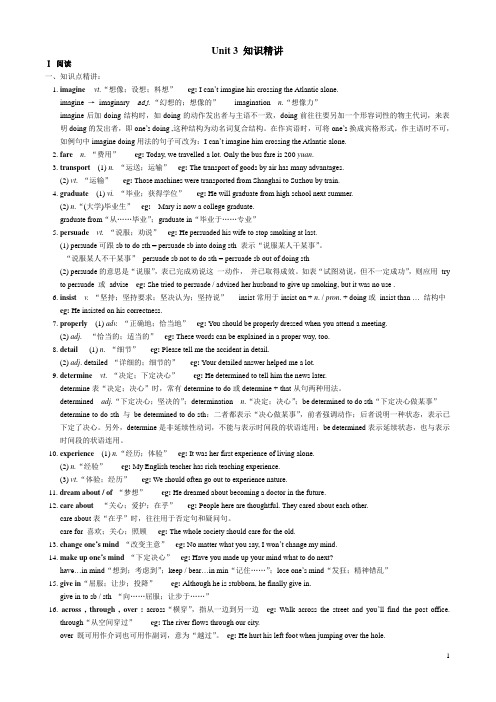
Unit 3 知识精讲Ⅰ阅读一、知识点精讲:1. imagine vt.“想像;设想;料想”eg: I can’t imagine his crossing the Atlantic alone.imagine→imaginary adj.“幻想的;想像的”imagination n.“想像力”imagine后加doing结构时,如doing的动作发出者与主语不一致,doing前往往要另加一个形容词性的物主代词,来表明doing的发出者,即one’s doing ,这种结构为动名词复合结构。
在作宾语时,可将one’s换成宾格形式,作主语时不可,如例句中imagine doing用法的句子可改为:I can’t imagine him crossing the Atlantic alone.2. fare n. “费用”eg: Today, we travelled a lot. Only the bus fare is 200 yuan.3. transport(1) n.“运送;运输”eg: The transport of goods by air has many advantages.(2) vt. “运输”eg: Those machines were transported from Shanghai to Suzhou by train.4. graduate(1) vi.“毕业;获得学位”eg: He will graduate from high school next summer.(2) n.“(大学)毕业生”eg: Mary is now a college graduate.graduate from“从……毕业”;graduate in“毕业于……专业”5. persuade vt.“说服;劝说”eg: He persuaded his wife to stop smoking at last.(1) persuade可跟sb to do sth = persuade sb into doing sth 表示“说服某人干某事”。
2020英语新教材人教新高一必修一 Unit 3 课文词汇语法填空练习 含答案
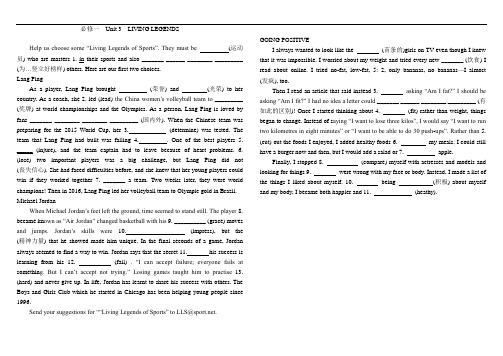
必修一Unit 3 LIVING LEGENDSHelp us choose some “Living Legends of Sports”. They must be (运动员) who are masters 1. in their sports and also _______ ______ ________ _________ (为…竖立好榜样) others. Here are our first two choices.Lang PingAs a player, Lang Ping brought (荣誉) and (光荣) to her country. As a coach, she 2. led (lead) the China women’s volleyball team to _________ (奖牌) at world championships and the Olympics. As a person, Lang Ping is loved by fans _______ ________ ________ _________ (国内外). When the Chinese team was preparing for the 2015 World Cup, her 3. (determine) was tested. The team that Lang Ping had built was falling 4. . One of the best players 5. _____ (injure), and the team captain had to leave because of heart problems. 6. (lose) two important players was a big challenge, but Lang Ping did not (丧失信心). She had faced difficulties before, and she knew that her young players could win if they worked together 7. _______ a team. Two weeks later, they were world champions! Then in 2016, Lang Ping led her volleyball team to Olympic gold in Brazil. Michael JordanWhen Michael Jordan’s feet left the ground, time seemed to stand still. The player 8. became kn own as “Air Jordan” changed basketball with his 9. __________ (grace) moves and jumps. Jordan’s skills were 10. (impress), but the (精神力量) that he showed made him unique. In the final seconds of a game, Jordan always seemed to find a way to win. Jordan says that the secret 11. his success is learning from his 12. (fail) . “I can accept failure; everyone fails at somethin g. But I can’t accept not trying.” Losing games taught him to practise 13. (hard) and never give up. In life, Jordan has learnt to share his success with others. The Boys and Girls Club which he started in Chicago has been helping young people since 1996.Send your suggestions for ““Living Legends of Sports” to LLS@.GOING POSITIVEI always wanted to look like the (苗条的)girls on TV even though I knew that it was impossible. I worried about my weight and tried every new _______ (饮食) I read about online. I tried no-fat, low-fat, 5: 2, only bananas, no bananas—I almost (发疯), too.Then I read an article that said instead 3. asking “Am I fat?” I should be asking “Am I fit?” I had no idea a letter could _______ ______ ________ _________ (有如此的区别)! Once I started thinking about 4. (fit) rather than weight, things began to change. Instead of s aying “I want to lose three kilos”, I would say “I want to run two kilometres in eight minutes” or “I want to be able to do 30 push-ups”. Rather than 5. (cut) out the foods I enjoyed, I added healthy foods 6. my meals. I could still have a burger now and then, but I would add a salad or 7. apple.Finally, I stopped 8. (compare) myself with actresses and models and looking for things 9. were wrong with my face or body. Instead, I made a list of the things I liked about myself. 10. being (积极) about myself and my body, I became both happier and 11. (heathy).必修一Unit 3 LIVING LEGENDSHelp us choose some “Living Legends of Sports”. They must be athletes(运动员) who are masters 1. in their sports and also set good examples for (为…竖立好榜样) others. Here are our first two choices.Lang PingAs a player, Lang Ping brought honour (荣誉) and glory(光荣) to her country. As a coach, she 2. led (lead) the China women’s volleyball t eam to medals(奖牌) at world championships and the Olympics. As a person, Lang Ping is loved by fans at home and abroad (国内外). When the Chinese team was preparing for the 2015 World Cup, her 3. determination (determine) was tested. The team that Lang Ping had built was falling 4. apart. One of the best players 5. had been injured (injure), and the team captain had to leave because of heart problems. 6. Losing (lose) two important players was a big challenge, but Lang Ping did not lose heart (丧失信心). She had faced difficulties before, and she knew that her young players could win if they worked together 7. as a team. Two weeks later, they were world champions! Then in 2016, Lang Ping led her volleyball team to Olympic gold in Brazil.Michael JordanWhen Michael Jordan’s feet left the ground, time seemed to stand still. The player 8. who became known as “Air Jordan” changed basketball with his 9. graceful (grace) moves and jumps. Jordan’s skills were 10. impressive (impress), but the mental strength (精神力量) that he showed made him unique. In the final seconds of a game, Jordan always seemed to find a way to win. Jordan says that the secret 11. to his success is learning from his 12. failures (fail) . “I can accept failure; everyone fails at something.B ut I can’t accept not trying.” Losing games taught him to practise 13. harder (hard) and never give up. In life, Jordan has learnt to share his success with others. The Boys and Girls Club which he started in Chicago has been helping young people since 1996.Send your suggestions for ““Living Legends of Sports” to LLS@.GOING POSITIVEI always wanted to look like the slim (苗条的)girls on TV even though I knew that it was impossible. I worried about my weight and tried every new diet (饮食) I read about online. I tried no-fat, low-fat, 5: 2, only bananas, no bananas—I almost went bananas (发疯), too.Then I read an article that said instead 3. of asking “Am I fat?” I should be asking “Am I fit?” I had no idea a letter could make such a difference(有如此的区别)! Once I started thinking about 4. fitness (fit) rather than weight, things began to change. Instead of saying “I want to lose three kilos”, I would say “I want to run two kilometres in eight minutes” or “I want to be able to do 30 push-ups”. Rather than 5. cutting (cut) out the foods I enjoyed, I added healthy foods 6. to my meals. I could still have a burger now and then, but I would add a salad or 7. an apple.Finally, I stopped 8. comparing (compare) myself with actresses and models and looking for things 9. that were wrong with my face or body. Instead, I made a list of the things I liked about myself. 10. By being positive(积极) about myself and my body, I became both happier and 11. healthier (heathy).。
高中英语 人教版新教材选择性必修第一册unit3 using language 原创课文语法填空
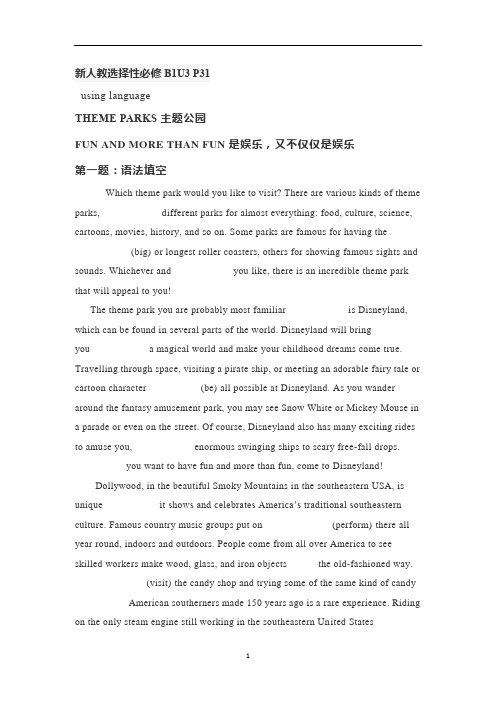
新人教选择性必修B1U3P31using languageTHEME PARKS主题公园FUN AND MORE THAN FUN是娱乐,又不仅仅是娱乐第一题:语法填空Which theme park would you like to visit? There are various kinds of theme parks, ___________ different parks for almost everything: food, culture, science, cartoons, movies, history, and so on. Some parks are famous for having the___________(big) or longest roller coasters, others for showing famous sights and sounds. Whichever and ___________ you like, there is an incredible theme park that will appeal to you!The theme park you are probably most familiar ___________ is Disneyland, which can be found in several parts of the world. Disneyland will bringyou___________ a magical world and make your childhood dreams come true. Travelling through space, visiting a pirate ship, or meeting an adorable fairy tale or cartoon character __________(be) all possible at Disneyland. As you wander around the fantasy amusement park, you may see Snow White or Mickey Mouse in a parade or even on the street. Of course, Disneyland also has many exciting rides to amuse you, ___________ enormous swinging ships to scary free-fall drops.__________you want to have fun and more than fun, come to Disneyland!Dollywood, in the beautiful Smoky Mountains in the southeastern USA, is unique __________ it shows and celebrates America’s traditional southeastern culture. Famous country music groups put on _____________(perform) there all year round, indoors and outdoors. People come from all over America to see skilled workers make wood, glass, and iron objects _____ the old-fashioned way. ______________(visit) the candy shop and trying some of the same kind of candy __________ American southerners made 150 years ago is a rare experience. Riding on the only steam engine still working in the southeastern United Statesis__________ special treat. And for those who like rides, Dollywood has a superb old wooden roller coaster, Thunderhead. It is world-famous for having the longest track in the smallest space. Come to Dollywood to have fun learning all about Ame rica’s historical southeastern culture!Chimelong Ocean Kingdom in Zhuhai, China, is one of the leadingocean-themed ___________(park) in the world. Here you can walk under the Whale Shark Aquarium —the world’s largest—and see up to 20, 000 fish, in addition _________ a whale shark 68 metres in length. ______________(watch) the dolphin and sea lion shows is both educational and fun. Of course, you can also see all kinds of interesting animals, including polar bears. The park has more rides than you can imagine: join a water fight_______ pirates, get turned upside down by an exciting roller coaster, or get wet in one of the water rides! Then at night, see the splendid Journey of Lights Parade and fireworks display. Hungry? The park has plenty of restaurants with tasty food____________every appetite —you can even eat while ___________(watch) the fish swim by. If it is ocean entertainment that you are looking for, come to Chimelong Ocean Kingdom!1___________________2____________________3________________4___________________5____________________6________________7___________________8____________________9________________10___________________11____________________12_____________13___________________14____________________15_____________16_____________________17_________________18.__________19______________20_____________________答案1.with2.biggest3.whatever4.with5.into6.are7.from8.If9.because10.p erformances11.i n12.v isiting13.t hat14.a15.p arks16.t o17.w atching18.a gainst19.f or20.w atching第二题:中英文翻译Which theme park would you like to visit? There are various kinds of theme parks, with different parks for almost everything: food, culture, science, cartoons, movies, history, and so on. Some parks are famous for having the biggest or longest roller coasters, others for showing famous sights and sounds. Whichever and whatever you like, there is an incredible theme park that will appeal to you!你喜欢参观哪一个主题公园呢?主题公园有不同的种类,不同的公园有不同的主题,几乎囊括了一切:食物,文化、科学、卡通、电影、历史等等。
高中英语人教版(2019) 选择性必修一 Unit 3 课文语法填空(含答案)

【课文语法填空】新人教版选择性必修一Unit 3【Reading and Thinking】SAREK NATIONAL PARK—EUROPE’S HIDDEN NATURAL TREASUREI wake up to the sound of the wind buffeting the cloth of my tent. Even though the sun isleave my tent and walk over to the mountain edge. Spreading out before me, branches of the Rapa River flow through the valley below. I’m in the remote far north of Sweden in Sarek National Park, a place with no roads or towns.ice melted, leaving behind about 100 glaciers. Soon after, reindeer began to arrive. Following thedifficult, so apart from the Sami very few people have ever seen Sarek. In 1909, Sarek was made a national park in order to keep the land in its natural state. Though the Sami are allowed to continuewithin park boundaries. At the far side of the valley, an ancient Sami cottage is visible. Close by, there are a few reindeer feeding on grass.For hundreds of years, looking after reindeer was a way of life for the Sami. They used the reindeer’s meat for food, their bones for tools, and their skin for making clothes and tents. Since reindeer were always on the move, the Sami would pick up their tents and accompany them.valleys of Sarek, living in tents or old cottages and enjoying their traditions. I am not a Sami, butin Sarek I’ve adopted some of their habits. For example, this morning my breakfast is flat brea d warmed over a fire, dried reindeer meat, and some sweet and sour berries that I found growing near my tent.After breakfast, I pack my bag and set out again. Since I must carry all of my food andbe full of sweat and hard work as I hike over this difficult land to my destination on the other sidefeel blessed to be alive. Here I am, alone under this broad sky, breathing the fresh air, and enjoying this great adventure. What could be better?【参考答案】1. brightly2. Checking3. be covered4. who5. Getting6. development7. their8. a9. with 10. makes【Using Language】THEME PARKSFUN AND MORE THAN FUNwith different parks for almost everything: food, culture, science, cartoons, movies, history, and so on. Some parks are famous for having the biggest or longest roller coasters, others for showingpark that will appeal to you!found in several parts of the world. Disneyland will bring you into a magical world and make your childhood dreams come true. Travelling through space, visiting a pirate ship, or meeting an adorable fairytale or cartoon character are all possible at Disneyland. As you wander around the fantasy amusement park, you may see Snow White or Mickey Mouse in a parade or even on theswinging ships to scary free-fall drops. If you want to have fun and more than fun, come to Disneyland!Dollywood, in the beautiful Smoky Mountains in the southeastern USA, is unique because it shows and celebrates America’s traditional southeaste rn culture. Famous country music groups put on performances there all year round, indoors and outdoors. People come from all overVisiting the candy shop and trying some of the same kind of candy that American southernerssuperb old wooden roller coaster, Thunderhead. It is world-famous for having the longest track in the smallest space. Come to Dollywood to have fun learning all about America’s historical southeastern culture!Chimelong Ocean Kingdom in Zhuhai, China, is one of the leading ocean-themed parks in the world. Here you can walk under the Whale Shark Aquarium—the world’s largest—and see upsea lion shows is both educational and fun. Of course, you can also see all kinds of interestingfight against pirates, get turned upside down by an exciting roller coaster, or get wet in one of the water rides! Then at night, see the splendid Journey of Lights Parade and fireworks display. Hungry? The park has plenty of restaurants with tasty food for every appetite—you can even eatto Chimelong Ocean Kingdom!【参考答案】1. various2. an3. probably4. to amuse5. in6. Riding7. who8. to9. including 10. entertainment。
- 1、下载文档前请自行甄别文档内容的完整性,平台不提供额外的编辑、内容补充、找答案等附加服务。
- 2、"仅部分预览"的文档,不可在线预览部分如存在完整性等问题,可反馈申请退款(可完整预览的文档不适用该条件!)。
- 3、如文档侵犯您的权益,请联系客服反馈,我们会尽快为您处理(人工客服工作时间:9:00-18:30)。
Unit 3 Reading课文语法填空
Journey Down the Mekong
一、语法填空(根据课文内容、依据语法规则完成下面短文)
Wang Kun and his sister Wang Wei had dreamed about 1________ (take) a great bike trip. They decided to cycle 2________ the entire Mekong River from 3________ it begins to where it ends. Wang Wei 4________ (insist) that they start from Qinghai where the river begins in order to see all of the Mekong River. Wang Kun said it 5________ (be) very difficult, because their journey would begin at an altitude of more than 5,000 metres. But Wang Wei refused to change her mind, 6________ (say) that it would be 7________ interesting experience.
The Mekong River 8________ (begin) in a glacier on a mountain in Qinghai Province. The river is small at first. It moves 9________ (rapid) as it passes through deep valleys. Sometimes the river becomes a waterfall and enters wide valleys. After 10________ flows out of China,it continues to flow through Southeast Asia. At last, the river delta enters the South China Sea.
参考答案:一、
1. taking
2. along
3. where
4. insisted
5. would be
6. saying
7. an
8. begins
9. rapidly
10. it。
